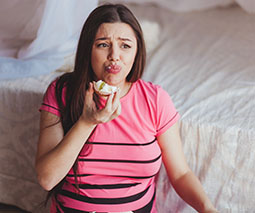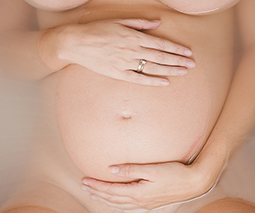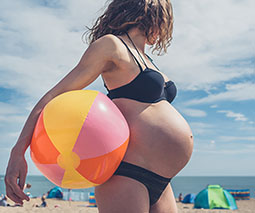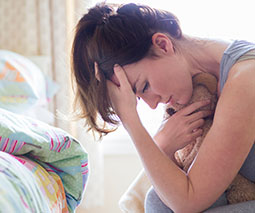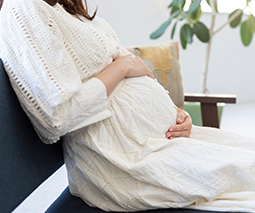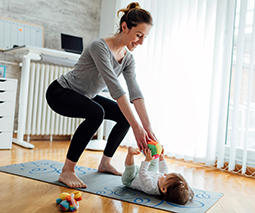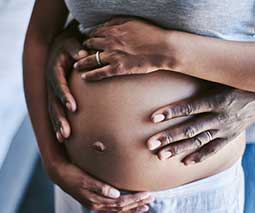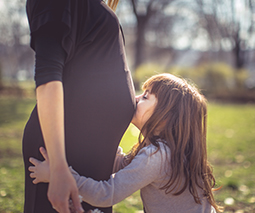“Pregnancy did not cure my endometriosis”: A new mum shares her story of endo
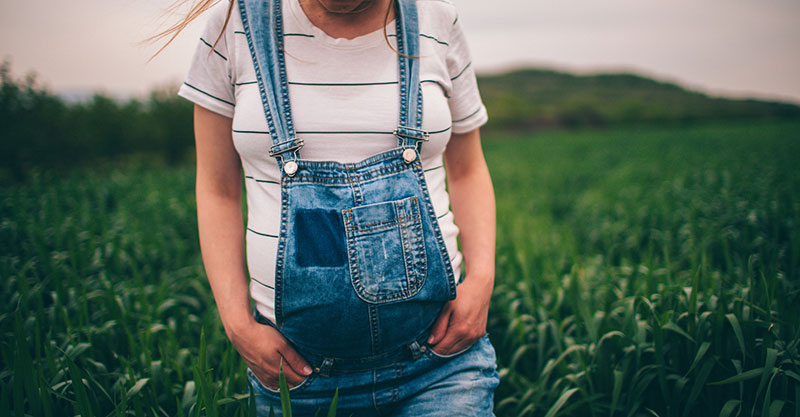
A very common misconception about endometriosis is that the condition can be cured with pregnancy.
Speaking to physiotherapist and pelvic floor expert, Heba Shaheed in our new Babyology podcast, Bellies, Bits and Babies, new mum Melanie says that pregnancy certainly didn’t cure her endometriosis – but it did change her symptoms.
“To be brutally honest”
Melanie says, “There had been so many doctors who had sat in front of me and said, ‘Have a baby, it’s a great idea to cure your endometriosis’. Doctors that didn’t really know what they were talking about, to be brutally honest and in due respect to them, because now 16 months after having my daughter, pregnancy has definitely not cured endometriosis.
“It’s changed it; my hormones have definitely changed, but I found that as soon as I finished breastfeeding … the endometriosis started flaring almost immediately.”
Listen to Melanie’s full story:
What is endometriosis?
Period pain is a common symptom of endometriosis, but it’s not the only one.
“Others can also have symptoms like fatigue and later on in life, a lot of women also experience infertility,” Heba says.
To fully understand what endometriosis is, think about what happens during a woman’s period.
“Normally the lining of the uterus will build up, and it then breaks down and exits your body through your period. However, with endometriosis what happens is there are cells that are similar to the lining of the uterus which exist in other places inside and outside of the pelvis,” Heba explains.
“They can be on your bowels. They can be on your ovaries, on your fallopian tubes, on your bladder and they’ve even been found in other places such as on the brain and on the lungs, which is pretty crazy, and unfortunately, these cells can bleed too, similar to the lining of the uterus.”
Unlike a regular period occurring in the uterus, these cells have nowhere to go and they build up inside the body, causing “inflammation, scarring adhesions, and a lot of pain in women.”
If the cells grow in certain places like on the ovaries or fallopian tubes, it’s possible for women to eventually become infertile.
“It’s not just surgery”: Treating endometriosis
When it comes to treating endometriosis, a 360-degree approach is best.
“It’s not just surgery that’s going to help. It’s not just these pills and hormonal treatments. It has to be your entire lifestyle. You know what you eat, what you don’t eat, how you move and how you exercise,” says Heba.
Melanie agrees with Heba’s approach to treating endometriosis – especially when it came to getting pregnant.
“So I really did kind of a 360 approach to my endometriosis, which I found very empowering, because it took it away from just the traditional medical doctors and gave me some control over it as well,” says Melanie.
“When I was trying to get pregnant, naturopathy was a really big help, but beyond that, I guess the other thing I did was look at Chinese medicine as well and found a specialist in that area.”
The pain was under control
Once pregnant, Melanie said she noticed a huge drop in her pain levels.
“I found that during my pregnancy, I wasn’t suffering in any of the same ways that I was when I wasn’t pregnant,” she says. “I think part of that was around the muscle relaxant hormone in pregnancy, so the relaxin, and I think that helped with some of the muscular issues.”
Read more about endometriosis:
- Endometriosis: The silent disease that can affect a woman’s fertility
- “I didn’t plan a c-section. I didn’t want a c-section … but my body didn’t fail”
- Endometriosis: Emma Wiggle was “freaking out” over deteriorating health
Breastfeeding and endometriosis
“While I was breastfeeding, I found that my endometriosis was definitely slightly in remission if you like. I found the pain was much more under control for me,” said Melanie.
However, things soon changed.
“My endometriosis really flared once I stopped breastfeeding,” Melanie added. “And the hormones changed again, and that was the time where I really realised that it wasn’t over.”
“The postpartum period can be really tough”
Unfortunately, it’s the hormonal changes that come with being pregnant that can help reduce the pain that comes with endometriosis, but as Heba explains: “It’s not necessarily a cure.”
“The postpartum period can be really tough on a lot of mums,” says Heba. “And women with endometriosis can have a particularly difficult time because we know that endometriosis is a hormonally driven condition and we know that a lot of women who have endometriosis can also develop other hormonal issues.”
Something Melanie knows all too well, having developed an autoimmune disease since the birth of her daughter.
“[The diagnosis] just feels like the next stage in the endometriosis journey and the initial diagnosis felt like just another kind of a slap in the hormone face,” she says.
“But I think it’s really interesting to understand that it’s actually all related and we can really look at our bodies from a completely 360 point of view and understand how much everything is interlinked”
Importantly, Melanie wants to remind new mums to continue looking after themselves throughout their pregnancy – but also beyond that.
“I think we need to remember to look after ourselves because once we get pregnant once we’ve created those people, little people, the journey doesn’t end for our bodies and we really need to remember to look after ourselves in the postpartum period and beyond as well.”
You can find more pelvic health tips and tricks for from Heba Shaheed in our new weekly podcast, Bellies, Bits and Babies. In six practical weekly episodes, Heba shares her expertise to improve women’s pelvic health before and after childbirth.
You can listen to Bellies, Bits and Babies with Apple Podcasts and Google Podcasts
